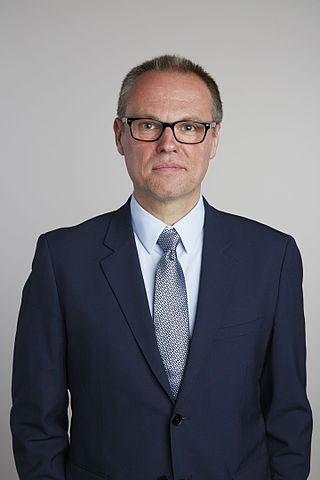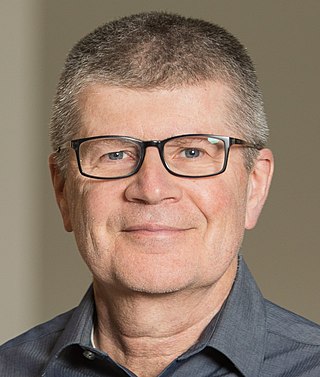Related Research Articles

Gero Andreas Miesenböck is an Austrian scientist. He is currently Waynflete Professor of Physiology and Director of the Centre for Neural Circuits and Behaviour (CNCB) at the University of Oxford and a fellow of Magdalen College, Oxford.

Philippa "Pippa" Marrack, FRS is an English immunologist and academic, based in the United States, best known for her research and discoveries pertaining to T cells. Marrack is the Ida and Cecil Green Professor and chair of the Department of Biomedical Research at National Jewish Health and a distinguished professor of immunology and microbiology at the University of Colorado Denver.
Timothy "Tim" A. Springer is an immunologist and the Latham Family Professor at Harvard Medical School. He is also a professor at the Department of Biological Chemistry and Molecular Pharmacology and of the Division of Medical Sciences, and a Senior Investigator at the Research Program in Cellular and Molecular Medicine of the Boston Children's Hospital. Springer is best known for discovering the first integrins, LFA-1, and intercellular adhesion molecules (ICAMs), and for elucidating how these cell adhesion molecules function in the immune system. In recent years, Springer's research interest has expanded to malaria, transforming growth factor beta (TGF-β) signaling, and von Willebrand factor.
Christopher Carl Goodnow is an immunology researcher and the current executive director of the Garvan Institute of Medical Research. He holds the Bill and Patricia Ritchie Foundation Chair and is a Conjoint Professor in the faculty of medicine at UNSW Sydney. He holds dual Australian and US citizenship.

Brian J. Druker is a physician-scientist at Oregon Health & Science University (OHSU), in Portland, Oregon. He is the director of OHSU's Knight Cancer Institute, JELD-WEN Chair of Leukemia Research, Associate Dean for Oncology in the OHSU School of Medicine, and professor of medicine.

Edward S. Boyden is an American neuroscientist at MIT. He is the Y. Eva Tan Professor in Neurotechnology, a faculty member in the MIT Media Lab and an associate member of the McGovern Institute for Brain Research. In 2018 he was named a Howard Hughes Medical Institute Investigator. He is recognized for his work on optogenetics. In this technology, a light-sensitive ion channel such as channelrhodopsin-2 is genetically expressed in neurons, allowing neuronal activity to be controlled by light. There were early efforts to achieve targeted optical control dating back to 2002 that did not involve a directly light-activated ion channel, but it was the method based on directly light-activated channels from microbes, such as channelrhodopsin, emerging in 2005 that turned out to be broadly useful. Optogenetics in this way has been widely adopted by neuroscientists as a research tool, and it is also thought to have potential therapeutic applications. Boyden joined the MIT faculty in 2007, and continues to develop new optogenetic tools as well as other technologies for the manipulation of brain activity. Previously, Boyden received degrees in electrical engineering, computer science, and physics from MIT. During high school, Boyden attended the Texas Academy of Mathematics and Science.
Laurie Hollis Glimcher is an American physician-scientist who was appointed president and CEO of Dana–Farber Cancer Institute in October 2016. She was elected a Member of the American Philosophical Society in 2019.
Frederick W. Alt is an American geneticist. He is a member of the Immunology section of the National Academy of Sciences and a Charles A. Janeway Professor of Pediatrics, and Professor of Genetics at Harvard Medical School. He is the Director of the Program in Cellular and Molecular Medicine at the Boston Children's Hospital. He is a Howard Hughes Medical Institute investigator, since 1987.
The Warren Alpert Foundation Prize is awarded annually to scientist(s) whose scientific achievements have led to the prevention, cure or treatment of human diseases or disorders, and/or whose research constitutes a seminal scientific finding that holds great promise of ultimately changing our understanding of or ability to treat disease. The prize was established in 1987 by the late philanthropist and businessman Warren Alpert and the Warren Alpert Foundation.

James Patrick Allison is an American immunologist and Nobel laureate who holds the position of professor and chair of immunology and executive director of immunotherapy platform at the MD Anderson Cancer Center at the University of Texas.

Lynne Elizabeth Maquat is an American biochemist and molecular biologist whose research focuses on the cellular mechanisms of human disease. She is an elected member of the American Academy of Arts and Sciences, the National Academy of Sciences and the National Academy of Medicine. She currently holds the J. Lowell Orbison Endowed Chair and is a professor of biochemistry and biophysics, pediatrics and of oncology at the University of Rochester Medical Center. Professor Maquat is also Founding Director of the Center for RNA Biology and Founding Chair of Graduate Women in Science at the University of Rochester.

Tasuku Honjo is a Japanese physician-scientist and immunologist. He won the 2018 Nobel Prize in Physiology or Medicine and is best known for his identification of programmed cell death protein 1 (PD-1). He is also known for his molecular identification of cytokines: IL-4 and IL-5, as well as the discovery of activation-induced cytidine deaminase (AID) that is essential for class switch recombination and somatic hypermutation.

The American Association of Immunologists (AAI) is an international scientific society dedicated to furthering the study of immunology. AAI provides its members with a variety of platforms in which to exchange ideas and present the latest immunological research, including the AAI annual meeting and The Journal of Immunology. In 2017, AAI launched an open-access journal, ImmunoHorizons. AAI is a founding member society of the Federation of American Societies for Experimental Biology (FASEB).

Michel C. Nussenzweig is a professor and head of the Laboratory of Molecular Immunology at The Rockefeller University and a Howard Hughes Medical Institute investigator. He is a member of both the US National Academy of Medicine and the US National Academy of Sciences.
The American Association of Immunologists Lifetime Achievement Award is the highest honor bestowed by the American Association of Immunologists (AAI). It has been awarded annually to a single AAI member since 1994.
Joel Habener is a Professor of Medicine at Harvard Medical School.
Bonnie W. Ramsey is the Endowed Chair in Cystic Fibrosis at the University of Washington School of Medicine and the director of the Center for Clinical and Translational Research at Seattle Children's Research Institute. Her research focuses on treatments for cystic fibrosis.
Leslie Joan Berg is an American immunologist. As a professor at University of Massachusetts Medical School, she was elected the 95th president of the American Association of Immunologists for a one-year term from 2011 to 2012. Berg’s research focuses on understanding the signal transduction pathways—the succession of reactions inside the cell as it changes one kind of stimulus, or signal, into another—important for T-cell development and activation, and the generation of protective immunity to infections.

Marc K. Jenkins is a Regents Professor and Director of the Center for Immunology at the University of Minnesota. He is a member of the National Academy of Sciences.
Lieping Chen is a Chinese-American immunologist and physician-scientist.
References
- ↑ "2017 Recipient, Arlene Sharpe, Harvard Medical School". www.warrenalpert.org. Archived from the original on 8 October 2017. Retrieved 8 October 2017.
- ↑ "Warren Alpert Foundation Prize Recipients 2017". www.warrenalpert.org. Retrieved 8 October 2017.
- 1 2 "Arlene H. Sharpe, M.D., Ph.D." www.aai.org. Retrieved 8 October 2017.
- ↑ "Arlene Sharpe". Harvard University. Retrieved 2 August 2018.
- ↑ "Arlene H. Sharpe". Arnold and Mabel Beckman Foundation. Archived from the original on 2 August 2018. Retrieved 1 August 2018.